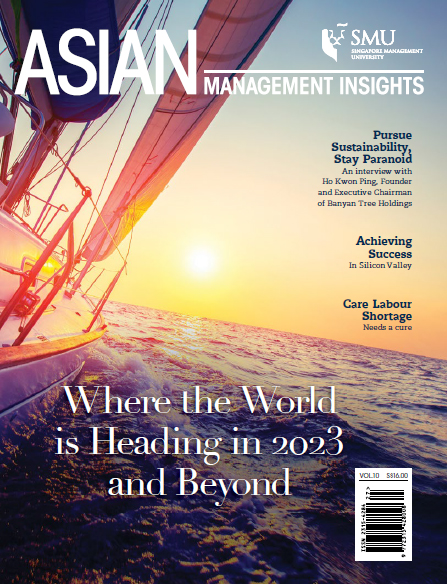Charting directions and steadying the ship amidst the storms, waves and currents
If the COVID-19 pandemic was the central theme from 2020 to 2022, geopolitics looks set to take centre stage in 2023. Given the war in Ukraine, as well as the increasingly strident sabre-rattling between the US and China, the rest of the world is girding itself for what could be significant economic fallout. Throw in high inflation and rapidly rising interest rates, and it is no wonder the world appears to be in an extended period of instability and insecurity, otherwise known as a ‘permacrisis’.
China’s post-COVID reopening will provide a boost for the global economy, says Simon Baptist, Chief Economist of the Economist Intelligence Unit, but the country’s ageing population– its mortality rate has surpassed its birth rate–and its maturing economy signal the end of double-digit GDP growth. Meanwhile, wider concerns over commodity security will occupy the attention of several governments, while the developed world ramps up its green transition to a low-carbon economy.
Banyan Tree Holdings, like the eponymous tree, has navigated the travails of the last few years and emerged stronger than ever. Its founder and Executive Chairman, Ho Kwon Ping, tells me how a commitment to physical sustainability and social justice built trust with employees, which guided the hospitality chain through the pandemic. From walking the talk by taking zero salary to reflecting on lessons learnt from numerous crises, he expresses optimism about Asia’s prospects and urges fretful youth to just “do something because you will learn along the way”.
Desmond Lim, co-founder of hourly worker people management platform Workstream, is a great example of doing and learning. The serial entrepreneur describes his experiences from running a restaurant while he was an undergraduate student, to working as an unpaid intern while taking his MBA, and the disappointment he experienced from a failed start-up. Through it all, he persevered and prevailed in Silicon Valley with the motto: Be humble and hungry.
Over in Southeast Asia, the start-up scene is maturing and founders can choose from plenty of investors and venture funds for investment. Yong Hsin Ning and Yvette Lim share how many founders are still unable to speak the language of numbers, and they therefore fail to attract the right investors. They propose a change in founders’ behaviour through adherence to the ‘Head’, ‘Heart’, and ‘Hand’ principles.
Perhaps those founders would benefit from focusing on developing the right vision. According to Rameshwari Ramachandra, Poorani Thanusha, Phat Ho Tan Phan, and Max-Ferdinand Scheichenost, a core individual in the organisation must serve as the sponsor to give life to the vision, driving its adoption and implementation over the long term. Most importantly, the vision must address the fundamental concerns of the customer, and progress must be measurable.
MYbank in China had a vision to create shared value with, and for, the millions of underserved small and medium enterprises (SMEs) and rural farmers. The Ant Group-backed company used Artificial Intelligence (AI) to reach customers with low balances, and thereby spark economic activity. With competition intensifying, this issue’s Case In Point by Heli Wang and Lipika Bhattacharya looks at how MYbank can remain competitive while steering a path between profitability and social responsibility.
In Nigeria, Logy.AI is also harnessing technology to serve the less affluent. Using a digital screening tool that operates through WhatsApp, Logy.AI generates oral digital reports. As Vijaya Sunder M and Rithica Mamidi write, value is created by combining non-digital products and services such as dental care with digital media platforms like WhatsApp.
Digital technology also plays a role in national healthcare systems as its population ages. Using Singapore as an example, How Choon How explains a country’s pivot towards prevention and early intervention, and how technology and digital initiatives can improve health outcomes. He also articulates the need to intensify sustainability efforts in national healthcare systems.
Hospitals hire a fair number of foreign healthcare professionals, and Yasmin Ortiga warns it might not be a sustainable practice in the long term. Countries like the Philippines are limiting the number of health professionals who can work overseas, while those who qualify for staff positions in Western countries are skipping places such as Singapore and Japan for the US and the UK. Policymakers must rethink the treatment of care workers as ‘temporary’ migrants to address the workforce shortage.
Also dealing with a talent gap is the manufacturing business, given the lure of tech start-ups and finance. Arnoud De Meyer, Kasra Ferdows, and Ann Vereecke argue that manufacturing can break out of its defensive mode, and build strategic strength instead. At the core of it all, it needs to embrace the increased data density of products and build tighter connections in the manufacturing process.
And we end where we begin: COVID-19 and geopolitics, specifically, the disrupted supply chains in the Asia-Pacific Economic Cooperation (APEC) region, and ways to repair them. Rebecca Sta Maria tells us how APEC is working on building connectivity in this part of the world, and focusing on flexibility, collaboration, and the environment.
Finally, you might have noticed this is the second issue this year after the first one in March. Asian Management Insights (AMI) now comes to you thrice instead of twice a year in March, July, and November. With the extra issue, we hope to introduce readers like yourself to the latest management issues, ideas, and innovations in the region. We welcome feedback and suggestions to make AMI an illuminating read.
2023 is half-done, and it has been eventful thus far. May the rest of the year bring relative peace, predictions of the world in permacrisis notwithstanding.
